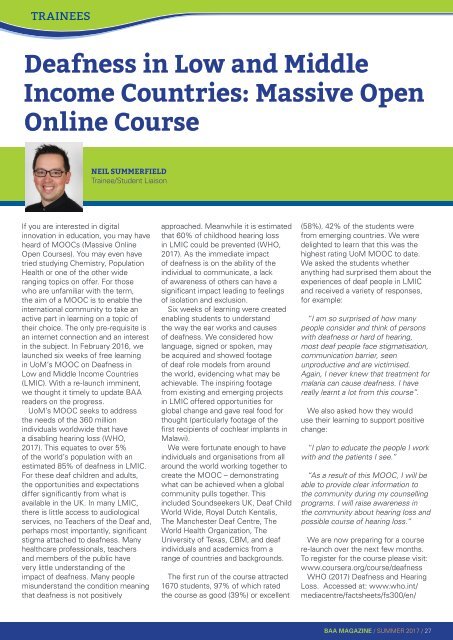BAA MAGAZINE SUMMER 2017 DRAFT 4
Create successful ePaper yourself
Turn your PDF publications into a flip-book with our unique Google optimized e-Paper software.
TRAINEES<br />
Deafness in Low and Middle<br />
Income Countries: Massive Open<br />
Online Course<br />
NEIL <strong>SUMMER</strong>FIELD<br />
Trainee/Student Liaison<br />
If you are interested in digital<br />
innovation in education, you may have<br />
heard of MOOCs (Massive Online<br />
Open Courses). You may even have<br />
tried studying Chemistry, Population<br />
Health or one of the other wide<br />
ranging topics on offer. For those<br />
who are unfamiliar with the term,<br />
the aim of a MOOC is to enable the<br />
international community to take an<br />
active part in learning on a topic of<br />
their choice. The only pre-requisite is<br />
an internet connection and an interest<br />
in the subject. In February 2016, we<br />
launched six weeks of free learning<br />
in UoM’s MOOC on Deafness in<br />
Low and Middle Income Countries<br />
(LMIC). With a re-launch imminent,<br />
we thought it timely to update <strong>BAA</strong><br />
readers on the progress.<br />
UoM’s MOOC seeks to address<br />
the needs of the 360 million<br />
individuals worldwide that have<br />
a disabling hearing loss (WHO,<br />
<strong>2017</strong>). This equates to over 5%<br />
of the world’s population with an<br />
estimated 85% of deafness in LMIC.<br />
For these deaf children and adults,<br />
the opportunities and expectations<br />
differ significantly from what is<br />
available in the UK. In many LMIC,<br />
there is little access to audiological<br />
services, no Teachers of the Deaf and,<br />
perhaps most importantly, significant<br />
stigma attached to deafness. Many<br />
healthcare professionals, teachers<br />
and members of the public have<br />
very little understanding of the<br />
impact of deafness. Many people<br />
misunderstand the condition meaning<br />
that deafness is not positively<br />
approached. Meanwhile it is estimated<br />
that 60% of childhood hearing loss<br />
in LMIC could be prevented (WHO,<br />
<strong>2017</strong>). As the immediate impact<br />
of deafness is on the ability of the<br />
individual to communicate, a lack<br />
of awareness of others can have a<br />
significant impact leading to feelings<br />
of isolation and exclusion.<br />
Six weeks of learning were created<br />
enabling students to understand<br />
the way the ear works and causes<br />
of deafness. We considered how<br />
language, signed or spoken, may<br />
be acquired and showed footage<br />
of deaf role models from around<br />
the world, evidencing what may be<br />
achievable. The inspiring footage<br />
from existing and emerging projects<br />
in LMIC offered opportunities for<br />
global change and gave real food for<br />
thought (particularly footage of the<br />
first recipients of cochlear implants in<br />
Malawi).<br />
We were fortunate enough to have<br />
individuals and organisations from all<br />
around the world working together to<br />
create the MOOC – demonstrating<br />
what can be achieved when a global<br />
community pulls together. This<br />
included Soundseekers UK, Deaf Child<br />
World Wide, Royal Dutch Kentalis,<br />
The Manchester Deaf Centre, The<br />
World Health Organization, The<br />
University of Texas, CBM, and deaf<br />
individuals and academics from a<br />
range of countries and backgrounds.<br />
The first run of the course attracted<br />
1670 students, 97% of which rated<br />
the course as good (39%) or excellent<br />
(58%). 42% of the students were<br />
from emerging countries. We were<br />
delighted to learn that this was the<br />
highest rating UoM MOOC to date.<br />
We asked the students whether<br />
anything had surprised them about the<br />
experiences of deaf people in LMIC<br />
and received a variety of responses,<br />
for example:<br />
“I am so surprised of how many<br />
people consider and think of persons<br />
with deafness or hard of hearing,<br />
most deaf people face stigmatisation,<br />
communication barrier, seen<br />
unproductive and are victimised.<br />
Again, I never knew that treatment for<br />
malaria can cause deafness. I have<br />
really learnt a lot from this course”.<br />
We also asked how they would<br />
use their learning to support positive<br />
change:<br />
“I plan to educate the people I work<br />
with and the patients I see.”<br />
“As a result of this MOOC, I will be<br />
able to provide clear information to<br />
the community during my counselling<br />
programs. I will raise awareness in<br />
the community about hearing loss and<br />
possible course of hearing loss.”<br />
We are now preparing for a course<br />
re-launch over the next few months.<br />
To register for the course please visit:<br />
www.coursera.org/course/deafness<br />
WHO (<strong>2017</strong>) Deafness and Hearing<br />
Loss. Accessed at: www.who.int/<br />
mediacentre/factsheets/fs300/en/<br />
<strong>BAA</strong> <strong>MAGAZINE</strong> / <strong>SUMMER</strong> <strong>2017</strong> / 27



